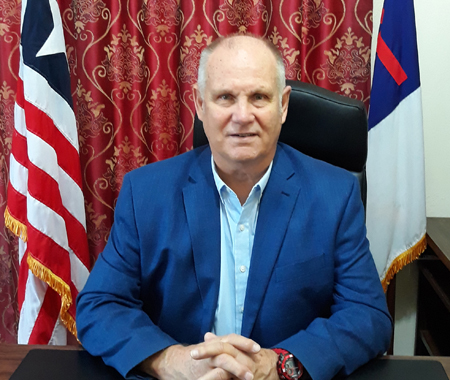
28
NovemberFALSE PROPHETS IN THE PULPITS OF LIBERIAN CHURCHES (Click here to read this article by Dr. Richard Calenberg)
FALSE PROPHETS IN THE
PULPITS OF LIBERIAN CHURCHES
Dr. Richard Calenberg
President of the
Evangelical Seminary of West Africa
As
an American missionary currently serving in Liberia, I have been observing African
churches and have been involved in training pastors in 14 countries of Africa
for almost 40 years. This includes churches and academic institutions of many
different denominations. I have appreciated the intense desire for training and
the enthusiasm for preaching in the pastors I have been privileged to instruct
in all these countries.
Here
in Liberia, the hard-fought presidential campaign and election have dominated
the lives and thinking of all Liberians for the past year. We all thank God for
the peaceful way the results were announced and received by the country. We
pray for a continued peaceful transition to a new administration.
But
as a trainer of pastors to teach and preach the Bible clearly, I am very
disturbed by the unmistakable evidence of a serious problem in many of the
Liberian churches pastored by supposed anointed “Men of God” who claim to be
“prophets” to whom and through whom God speaks. Many of these self-proclaimed “prophets”
declared unequivocally that the ruling party candidate would win reelection in
the presidential race because God had revealed it to them. There were also prophetic pontifications on
other office races, again with similar erroneous proclamations. As a
consequence of the announcement of the actual results, it appears that a real
crisis is facing these “prophets” and their churches. It is legitimate to ask,
“Is God confused or did God really speak to these self-proclaimed “prophets”?” It
is time that biblical reason and the clear truth from the pages of the inspired
revelation of God’s Word be loudly proclaimed to clear the theological fog that
is choking well-meaning and sincere believers who have put their trust in these
so-called “prophets.”
It
is important to first establish the identity of a true biblical prophet.
Throughout the Old Testament and into the period of the New Testament, certain
men and women were called by God to serve as His spokespersons, often in a time
of dire spiritual conditions. God gave these
instructions to His people concerning prophets through Moses, the prophet who
wrote the first five books of the Old Testament:
A prophet who presumes to speak in my name
anything I have not commanded, or a prophet who speaks in the name of other
gods, is to be put to death. Moses goes on and adds “You may say to yourselves,
‘How can we know when a message has not been spoken by the Lord?’ If what a
prophet proclaims in the name of the Lord does not take place or come true,
that is message the Lord has not spoken. That prophet has spoken presumptuously
so do not be alarmed” (Deuteronomy 18:20-22 NIV).
The
prophet Jeremiah was vehemently opposed by just such “false prophets” and wrote
the following about their sources and motivations: Quoting God, Jeremiah
writes:
I have heard what the prophets say who prophesy
lies in my name. They say, “I had a dream! I had a dream!” How long will this
continue in the hearts of these lying prophets, who prophesy the delusions of
their own minds? . . .
Let the prophet who has a dream recount the
dream, but let the one who has my word speak it faithfully. For what has straw
to do with grain? declares the Lord. Is not my word like fire, declares the
Lord, and like a hammer that breaks a rock in pieces? Therefore, declares the
Lord, I am against the prophets who steal from one another words supposedly
from me. Yes, declares the Lord, I am against the prophets who wag their own
tongues and yet declare, The Lord declares, “Indeed, I am against those who
prophesy false dreams, declares the Lord. They tell them and lead my people
astray with their reckless lies, yet I did not send or appoint them. They do
not benefit these people in the least,” declares the Lord. (Jeremiah 23:25-32
NIV).
False
prophets have always been a problem and that was true in the early church of
the First Century as well. As the church was being established in those early
years, false prophets and teachers became a serious problem as they attempted
to counter the apostolic teaching by unveiling fake truth that did not originate
from God. The source and delivery of this revelation was crucial in recognizing
truth from error. Peter affirmed the source of apostolic teaching while warning
his scattered readers about false “revelation.” He wrote:
We also have the prophetic message as
completely reliable, and you will do well to pay attention to it, as to a light
shining in a dark place. . .Above all, you must understand that no prophecy of
Scripture came from about by the prophet’s own interpretation. For prophecy
never had its origin in the human will, but prophets, though human, spoke from
God as they were carried along by the Holy Spirit. But there will be false
prophets among the people, just as there will be false teachers among you. . .
Many will follow their depraved conduct and will bring the way of truth into
disrepute. In their greed these teachers will exploit you with fabricated
stories. Their condemnation has long been hanging over them, and their
destruction has not been sleeping” (2 Peter 1:19-2:3 NIV).
It
is time for the church in Liberia to carefully heed the clear implications of
these passages. Any “prophet’ who prophesied something was the word of God that
did not prove to be so was declared a false prophet and according to the Old
Testament would be stoned. Obviously, that is not likely to happen in Liberia,
but the fact remains, these self-proclaimed “prophets” have proven they are not
prophets of God and have disqualified themselves for ministry. Truthful
integrity and blamelessness are two predominant qualifications for church
leadership (1 Timothy 3:1-7; Titus 1:6-9).
One
wonders why these pastors would make such prophetic claims, thinking or
pretending it was God who was speaking to them but in fact, it had to be
something or someone else, maybe themselves. It could even appear to be a form
of endorsement of a political candidate. Another motive for making false
prophetic claims mentioned in the passages quoted above was greed. One wonders
if there was some monetary reward extended to these “prophets” declaring a
winner before the election was held. In Liberia, there is great benefit to any
candidate to have a “Man of God” declare “the will of God” is in his favor.
It
is worth noting that when such a prophet/pastor has established himself as a
person possessing the divinely bestowed ability to prophetically tell the
future, including even who will become president of the nation, he can also be
consulted to reveal the destiny of individuals. People will flock to hear and
be advised by such an “anointed” person. In some cases, he/she may even begin
to charge a consultation fee, and thus become a “prophet for profit”!
Sadly,
when these false prophets are proven not to be what they claim to be, those well-meaning
people who sought their counsel begin to question the trustworthiness of God
and the integrity His Word, supposedly spoken through the man or woman the
believer trusted. The testimony of the gospel and of the church in Liberia is
negatively affected.
The
biblical fact is that God’s special revelation through true prophets and
apostles He chose and inspired to write His Word is already given. The Apostle
Paul stated there would come a time that no more such prophetic revelation
would be given. In the Word of God and the gift of the Spirit of God, believers
have everything they need to know the will of God and to live godly lives (1
Peter 1:3 NIV). In 1 Corinthians 13:8-9, Paul writes:
Love never fails. But where there are
prophecies, they will cease; where there are tongues, they will be stilled;
where there is knowledge, it will pass away. For we know in part, but when
completeness comes, what is in part disappears.
The
Apostle John, writing at the end of the New Testament era in the final book of
the canon of Scripture, the Revelation, adds this serious warning of those who
would add to the inspired revelation given by God:
I warn everyone who hears the words of the
prophecy of this scroll: If anyone adds anything to them, God will add to that
person the plagues described in this scroll (Revelation 22:18 NIV).
What
is needed in the churches of Liberia today is pastors who take the role of a
prophet and proclaim the revealed Word of God as found in the Holy Scriptures,
Genesis to Revelation. Claiming prophetic words and making them equal in
authority to Scriptures is contrary to the will and clear warning of the Word
of God.
My
question is, who is going to stand up for truth and declare what God’s Word
says about the false “prophets” we can clearly identify? It is time that
God-fearing, biblically driven church leaders expose and confront these suspect
pastor/prophets who are telling lies that are not benefiting the people of God.
Hopefully, humble repentance and a commitment to the study, teaching and
proclaiming of the Word of God will be the result.
At
the Evangelical Seminary of West Africa, we believe the Bible to be the
inspired, inerrant and infallible revelation of God and teach our students how
to carefully study, exegete and then effectively exposit and communicate it for
their people. When they speak, unlike false prophets and teachers, they can say
with complete certainty, “Thus says the Lord,” knowing that what He says is
certain and true! May their tribe increase in Liberia and across Africa! Amen


Reviews